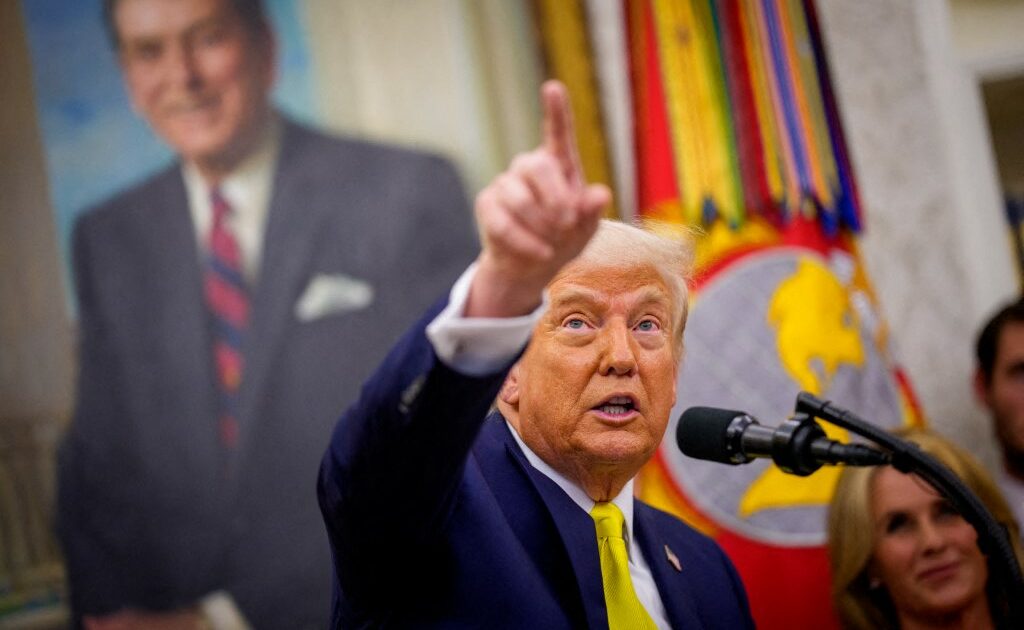The burgeoning BRICS alliance, comprising Brazil, Russia, India, China, and South Africa, along with newer participants like Iran, Egypt, Indonesia, Ethiopia, and the United Arab Emirates, convened in Rio de Janeiro for a two-day diplomatic meeting. Their primary objective was to address the ripple effects of US President Donald Trump’s escalating protectionist trade policies. This gathering, representing nearly half of the global population and a significant portion of the world’s GDP, underscored the growing unease within the international community regarding the potential disruptions to the global trading system caused by the American tariffs. The meeting, held under Brazil’s rotating chairmanship, served as a precursor to a higher-level summit planned for July, highlighting the urgency and importance of the issues at hand. The backdrop to these discussions was the International Monetary Fund’s recently revised global growth forecast, a downward revision attributed directly to the destabilising impact of the newly imposed US tariffs.
The focal point of the Rio de Janeiro meeting was the negotiation of a joint declaration emphasizing the crucial role of the multilateral trading system. This initiative reflected the BRICS nations’ commitment to upholding a rules-based global trade order, a system increasingly threatened by unilateral actions. President Trump’s aggressive trade maneuvers, including the implementation of a blanket 10% tariff on imports from numerous countries and significantly higher tariffs targeting China specifically, have ignited trade tensions and prompted retaliatory measures from affected nations. China, a central target of these tariffs, has responded with its own duties on US imports, escalating the trade war and further contributing to the global economic uncertainty. The BRICS alliance sought to present a unified front against these protectionist policies, advocating for collaborative solutions and emphasizing the importance of international cooperation in navigating the complex global trade landscape.
The BRICS nations have historically explored alternatives to the dominance of the US dollar in international trade, a topic that resurfaced at the previous year’s summit. President Trump’s reaction to these discussions, threatening punitive tariffs against member states pursuing non-dollar transactions, highlighted the sensitivity of the issue and the potential for further escalation of trade disputes. While the discussion of a unified BRICS currency remained premature, the alliance continued to explore mechanisms to enhance the role of national currencies in their mutual trade transactions, aiming to reduce their dependence on the US dollar and potentially mitigate the impact of US-imposed economic sanctions. This ongoing exploration underscores the BRICS nations’ desire for greater autonomy within the global financial system.
Beyond trade concerns, the ongoing war in Ukraine loomed large over the BRICS meeting. President Trump’s recent push for a peace agreement between Russia and Ukraine, coupled with Russia’s announcement of a three-day ceasefire, injected a new dynamic into the conflict. However, the White House’s dismissal of the ceasefire, emphasizing the need for a permanent resolution, underscored the persistent challenges in achieving a lasting peace. Trump’s evolving stance on the conflict, seemingly influenced by recent interactions with Ukrainian President Volodymyr Zelensky, further complicated the situation. His reported urging for Kyiv to reconsider its ambitions to reclaim Crimea signaled a potential shift in US policy and added another layer of complexity to the diplomatic landscape.
Climate change, a pressing global concern, emerged as another key priority for the BRICS nations, particularly for Brazil, which was gearing up to host the UN COP30 climate summit later in the year. The Amazon rainforest, a critical component of the global ecosystem, emphasized the importance of the summit’s location in Belem. The BRICS nations recognized the urgency of addressing climate change and sought to foster cooperation and collaboration in tackling this global challenge. Their focus on climate change underscored the alliance’s expanding agenda, moving beyond economic and geopolitical concerns to address critical environmental issues. This highlighted their commitment to a broader vision of global stability and sustainable development.
The BRICS meeting, expanding beyond its core members to include representatives from several “partner” nations, including former Soviet states, Cuba, Malaysia, Thailand, Uganda, and Nigeria, demonstrated the alliance’s growing influence and reach. The inclusion of these diverse nations broadened the scope of the discussions and reflected the increasing global interest in the BRICS platform as a forum for addressing shared concerns and promoting multilateral cooperation. This expanded format further solidified BRICS’s position as a significant force in shaping the evolving global landscape, promoting dialogue and collaboration amongst a diverse group of nations facing common challenges.














